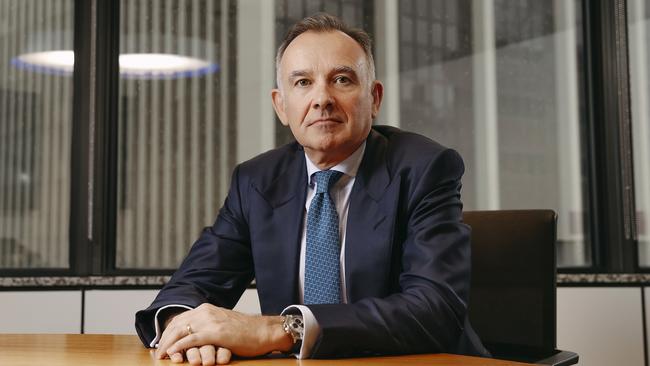Perpetual facing $500m tax bill from KKR deal
Perpetual shares sink as shareholders declare the deal with KKR dead following ATO tax update.

Perpetual’s $2.2bn carve-up and sale to KKR is in serious doubt after the tax office blindsided the wealth manager by indicating it would slap a $500m tax bill on the deal and remove any franking benefit for shareholders.
The mammoth tax bill, combined with the second tax hit to shareholders, as well as the large transaction costs Perpetual has already flagged, mean the wealth manager is now likely to walk away from the deal rather than spend two years fighting the ATO, sources say.
Investors were unlikely to approve the transaction due to the large tax hit, with the deal now effectively dead, one shareholder said. Perpetual shares fell 8.4 per cent or $1.84 to $20.07.
More than six months after announcing the carve-up – which would see private equity giant KKR walk away with the corporate trust and wealth management operations, as well as the Perpetual name – the 138-year-old wealth powerhouse on Tuesday said taxes and duties on the deal would be between $493m and $529m, based on the ATO’s assessment of its tax treatment on the transaction.
This was double Perpetual’s own estimate of taxes and duties owed, which it previously told shareholders would be between $106m and $227m.
In a further blow, the ATO indicated the entire cash proceeds from the transaction would be deemed as assessable unfranked dividends, meaning the payout to shareholders would be taxed at marginal rates.
Perpetual chief executive Bernard Reilly, who only stepped into the top job in September, said he and the board were disappointed with the ATO’s position.
“Often with tax positions, it’s a matter of judgment. The board and I disagree with the ATO’s interpretation, it’s as simple as that, particularly when it contradicts recent precedents as well. So we are very disappointed,” Mr Reilly said.
The $500m tax bill would reduce shareholder proceeds to as low as $5.74 to $6.42 per share, down from the $8.38 to $9.82 a share Perpetual had previously guided to.

Perpetual and shareholders will also be acutely aware that Perpetual’s market cap today is about the same price that KKR bid for just the wealth and corporate businesses (not accounting for Perpetual’s debt).
While Perpetual said it believed it had “strong grounds” to dispute the tax office’s position, the wealth manager must now assess whether that is in shareholders’ best interests, given it would probably be a lengthy fight with no guarantee of a win.
“Based on strong advice from relevant tax experts, including senior counsel, and following extensive board testing and consideration, Perpetual continues to be of the view that the provisions should not apply,” the company said.
In Perpetual’s assessment of the scheme, it noted numerous previous transactions that had been undertaken in a similar manner.
Mr Reilly said Perpetual and KKR were currently engaging over the ATO’s position to see “where we can get to from here”.
He wouldn’t speculate on whether the deal was now in jeopardy but said the rationale for the deal “still holds water”.
Mr Reilly was also unwilling to speculate on whether the original timeline, which would see shareholders vote on the deal in the first quarter of calendar 2025, was still likely, since talks with KKR were continuing.
The higher than expected tax bill unnerved Perpetual investors, who pushed the stock 8.6 per cent lower to a four-week low of $20.02.
K Capital’s David Kingston said the higher-than-expected leakage from the transaction could be a deal-breaker.
“If there’s two huge lots of leakage, being the high tax and transaction costs, they might just leave it. It comes back to the market cap, which is now the same as the transaction price. You’ve got to adjust for the debt in Perpetual, of course, but it is quite extraordinary how the market is valuing Perpetual. It looks cheap compared to how much KKR were prepared to pay,” he said.
Morgan Stanley analyst Andrei Stadnik said the tax hit lowered the likelihood of the sale completing, given it was subject to shareholder approval.
“We also note transaction and separation costs of $184m. We think these lower potential net sale proceeds make the current combined Perpetual group structure more attractive for shareholders. We also think that it would provide a better foundation for Perpetual’s proposed turnaround of its investments division, where shareholders would welcome better growth and flows,” he said in a note.
Citi analyst Nigel Pittaway warned the ATO’s view on the proposed scheme looked “extremely unfavourable for the deal’s prospects”.
“It seems highly likely today’s news will be a deal showstopper. It seems hard to see the independent expert now being able to recommend the deal as being in the best interest of shareholders while a shareholder vote would also be unlikely to proceed,” he said in a note.
The options now for Perpetual were to stay together or for a buyer to take the whole business, a move that would avoid the current tax issues, he added.
Perpetual’s CEO and board were criticised in May because of the tax unknowns when the carve-up was first announced.
Shareholders were given no idea what the net proceeds would be, with separation and transaction costs, as well as the hefty capital gains tax bill, all undisclosed at that point.
The wealth manager then came out months later with its estimate for the tax bill but told The Australian in August it was already considering its options if the deal didn’t go through.





To join the conversation, please log in. Don't have an account? Register
Join the conversation, you are commenting as Logout